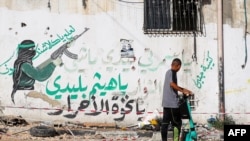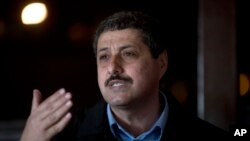"Death to Arabs!" chanted the angry mob as they encircled the university dormitories of Arab students in central Israel and tried to break down the doors.
"I am still shocked and afraid," said one of the dozens of terrified Arab Israelis who barricaded themselves inside the Netanya Academic College dorm late last month, speaking to AFP on condition of anonymity.
On that day, Hamas launched an unprecedented attack on Israel that killed more than 1,400 people, mostly civilians, according to Israeli authorities.
Aiming to destroy Hamas, Israel responded with a relentless bombardment and ground invasion of the Gaza Strip that has killed more than 10,500 people, also mostly civilians, according to the Hamas-run territory's health ministry.
The student said that shortly before the dorm attack, Israeli police came to question them for allegedly throwing eggs at religious Jewish Israelis.
"We denied it and told them 'The cameras are there. You can check them,'" the student told AFP.
"After that, a group gathered and tried to break down the door and attack us. They cursed us and demanded our expulsion."
Police escorted the students to the roof for their protection while others stood at the door to prevent the protesters from entering, the student said.
Social media posts
The police told AFP the incident took place after the "circulation of an old publication inciting terrorism, being presented as new", and that they were working to combat "false publications that sow panic among the public".
"Instigators will be punished," the police said.
Jafar Farah, director of the Mossawa Center which documents human rights violations against Arab Israelis, said far-right football fan club "La Familia," which has ties to National Security Minister Itamar Ben-Gvir, organised the protest.
He blamed the university, police and Netanya municipality for failing to prevent the attack.
Miriam Feirberg, the city's mayor, said the rioters should be prosecuted and students currently in the accommodation replaced by Israelis displaced from the south by the Hamas attack.
As well as raising tensions within Israel, the war has worsened relations between Palestinians and Israelis in the occupied West Bank and annexed east Jerusalem.
Even before the war, rights groups frequently highlighted regular discrimination faced by Arab Israelis, despite them holding Israeli citizenship.
"We left all our belongings in the dormitory," the student said.
"As Arabs, we are afraid to return to college, and some are afraid to return to their rented accommodation."
Nadim al-Nashif, director of 7amleh, a non-profit group focused on social media, said they have identified "590,000 violent conversations in Hebrew on platforms like Facebook" and Telegram.
Among the posts were calls for a "second Nakba," referring to the mass exodus of 750,000 Palestinians in 1948 during the war over the establishment of Israel, as well incitements to kill and expel Palestinians.
Drivers attacked
Nashif said his organization had reported many of the posts to the relevant platforms, leading to the removal of some.
Arab Israeli politician Ahmad Tibi said abuse was not unusual.
"There is no Arab Knesset (parliament) member who has not received threatening messages," he said, including death threats.
"Why don't the police take any action despite repeated complaints?"
Israeli labor union organization "Power to the Workers" said it had recorded attacks on Arab drivers, and warned of "increasing acts of violence against them".
One bus driver was sprayed with gas by a group of passengers after they learned he was an Arab. He was injured slightly when the vehicle then hit an electricity pole, the union said.
Another driver was attacked "by passengers who realised he was Arab and shouted, 'Terrorist... terrorist!' They smashed his windshield."
Dozens of right-wing Israelis demonstrated on Tuesday in the west Jerusalem neighborhood of Givat Shaul, mostly inhabited by observant Jews, against a shop that employs Arabs.
They held signs reading "Don't support terrorists" and "This branch employs terrorists."
Police prevented the protesters from entering the shop and eventually dispersed them, an employee said. But around 30 Arab workers did not return the next day.
"I didn't go to work. It's dangerous," said an employee identifying herself only as Huda.
"We no longer take Israeli public transportation for fear of racist attacks," she said. "The store management told us they couldn't guarantee our safety."












Forum